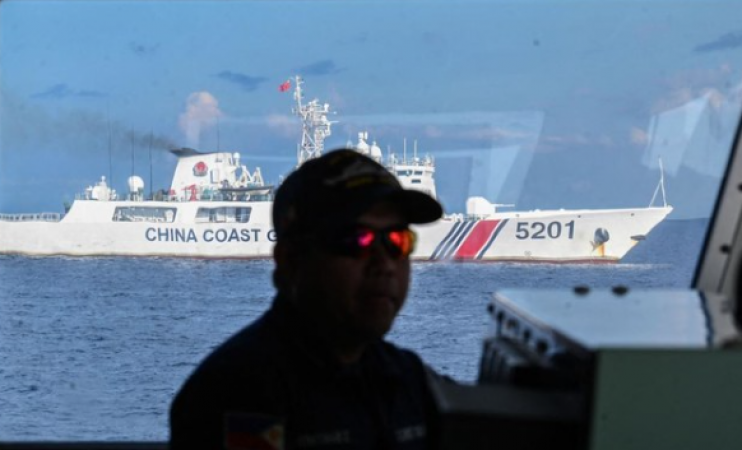
Taipei: In the contested South China Sea, a Chinese coast guard ship cut off a Philippine patrol boat carrying journalists, nearly resulting in a collision, as witnessed by an AFP team on board another boat.
The incident between China and the Philippines in the disputed waterway was the most recent in a steady string of near-misses that occurred off the Spratly Islands on Sunday.
A dozen islands and reefs were visited during the 1,670-kilometer (1,040-mile) patrol of the South China Sea by two Philippine Coast Guard boats, which included AFP as one of the invited media organisations.
Also Read: Egypt received more than 400 Filipino refugees fleeing Sudan
Throughout the six-day voyage, Chinese navy and coast guard ships followed the BRP Malapascua and BRP Malabrigo and repeatedly ordered them to leave the water.
When asked about the near-collision on Sunday, Malapascua commanding officer Rodel Hernandez said, "We would have collided on the bow if I hadn't cut the engine and thrown it in reverse." He compared the incident to a battle between "David and Goliath."
The incident took place as the Philippine coast guard vessels drew near Second Thomas Shoal, where Philippine marines were stationed in an abandoned navy ship that was grounded to enforce Manila's maritime claims.
A Chinese Coast Guard ship more than twice the size of the 44-meter Malapascua sailed into its path as it approached the shoal.
Hernandez claimed that the Chinese ship passed his boat within 45 metres, and that only his quick reactions prevented the steel-hulled ships from colliding with one another.
Less than a kilometre away, at the Malabrigo, AFP observed the incident.
There was a second Chinese coast guard vessel nearby. Hernandez claimed that during patrols near the shoal, Chinese boats frequently blocked his and other Philippine coast guard ships.
However, Sunday marked the "closest" he had ever witnessed two fleets collide.
The Chinese ships had been urged to "stay clear from our passage" after the Malapascua and Malabrigo announced their intent to enter the shoal to conduct a "site survey."
The Philippine boats were instructed to leave by the Chinese coast guard over the radio after it said that they were sailing in China's territorial waters without authorization.
More than 1,000 kilometres separate Second Thomas Shoal from China's closest major landmass, Hainan island, and about 200 kilometres separate it from the largest island in the Philippines, Palawan.
Also Read: Tariq used to doubt Shazia's character, burnt his wife alive
China has destroyed thousands of hectares of reef in the Spratlys over the last ten years to build militarised islands with ports, runways, and radar systems.
Hernandez, using the Filipino name for the shoal, warned that if they didn't stop harassing them, they would soon take over Ayungin as well. As a result, Hernandez said, "We Need to Be There Always and Challenge Their Harassment."
The incident happened the day after Chinese Foreign Minister Qin Gang met with Philippine President Ferdinand Marcos in Manila to discuss lowering tensions in the contentious waterway.
Beijing ignores a ruling by an international court that the assertion is unfounded and asserts sovereignty over almost the entire South China Sea, including the Spratly Islands.
Hundreds of Chinese coast guard and other vessels patrol the waters, swarming reefs and harassing and attacking fishing and other boats in order to support Beijing's claim.
More than a hundred Chinese ships were spotted by the Philippine coast guard on Saturday at Whitsun Reef, which the Philippines claims is a part of its exclusive economic zone.
The ships disobeyed orders from the Philippine coast guard to leave.
In contrast to his predecessor Rodrigo Duterte, who was reluctant to criticise Beijing, Marcos has insisted since taking office in June that he will not allow China to infringe on the Philippines' maritime rights.
As he looks to strengthen their defence ties, Marcos has meanwhile turned to the United States, the Philippines' longtime ally.
China is concerned about this change and claims that Washington is attempting to sour relations between Beijing and Manila.
In addition to the five bases specified in the 2014 Enhanced Defence Cooperation Agreement, or EDCA, Manila this month announced the locations of four more military bases that it is allowing the United States to utilise.
The four extra bases include two that are close to Taiwan, which Beijing claims as its territory, and one that is not far from the South China Sea.
China has expressed concern that the expanded EDCA may threaten regional stability and accused the United States of having a "zero-sum mentality."
Beijing is also upset about the largest-ever war games between the Philippines and the United States, which end on Friday.
On Wednesday, Marcos witnessed an exercise in which US and Philippine forces launched rockets at a decommissioned warship that was supposed to be an adversary in the South China Sea.
The three-day Chinese military exercise that mimicked targeted attacks and a blockade around Taiwan was followed by the annual Balikatan exercises.
Marcos stated on Monday that he will discuss the "need to tone down the rhetoric" regarding the South China Sea, Taiwan, and North Korea with US President Joe Biden at the White House the following week.
Marcos told a Philippine broadcaster, "The discussion is heating up, some harsh words are being exchanged, and we are worried." The Philippine Coast Guard has been attempting to raise awareness of China's activities in the South China Sea on a global scale.
Also Read: As Sudanese refugees arrive in Delhi, India is "extremely grateful" for Saudi assistance
However, it is difficult with only three patrol ships to keep an eye on the vast waters, according to Commodore Jay Tarriela, the Philippine Coast Guard's West Philippine Sea spokesman.
Commander Julio Colarina, the captain of the Malabrigo, was obstinate while at sea.
Despite the fact that the Philippines is a small country, Colarina said, "Our coast guard has a big heart and is willing to serve the Filipino people and an overwhelming loyalty and bravery to protect the republic.